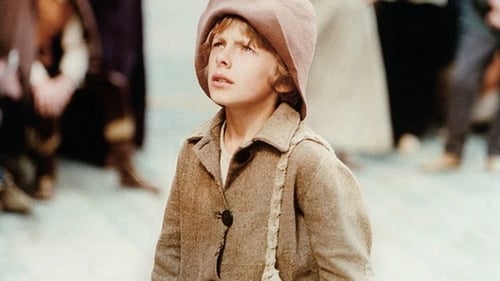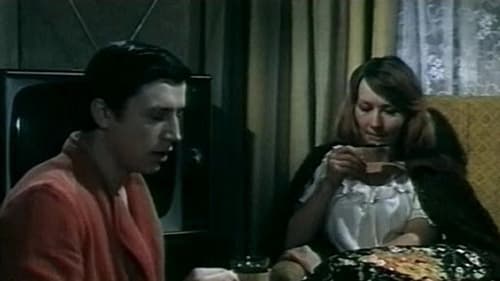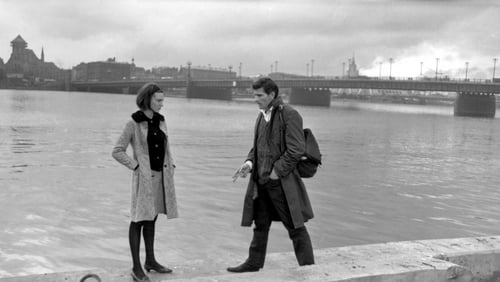
Music
This film is a story about that time in the Baltics, Latvia, and Riga. Young rebels of 1960s – nonconformists, hippies and beatniks – have turned into a generation of well-known writers, poets, musicians, directors, as well as politicians of the new independent Latvia. The ones who were 18, 20, or 25 in 1960s are half a century older today. The protagonists of the film are united by the bohemian gathering place of their youth, a small nameless cafe in the Old Town of Riga, commonly referred to as “Kaza” (The Goat). This place is surrounded by legends, myths and humorous stories.

Music
The two sisters' parents have gone abroad to earn the living, so the girls Marta and Linda needs someone to take care of them. For that they have their dictatorial spinster aunt Una, who desperately wants to get married, and has a sympathy for the jeweler Ivo. Meanwhile, Marta is working hard to get a promised puppy, but her plans are ruined, as her aunt feels a strong despise for dogs. So, the relations between the girls and their aunt becomes really tense. Until the perfect plan of the sisters - to help the aunt to get married, to get rid of her.

Music
Fairytale of the the good girl and the bad girl, who gets the prince?

Music

Music
A miller's son, Johannes, falls in love with the daughter of a wealthy landowner, Victoria. The novel follows them through adolescence, as Johannes struggles with the social hierarchy and becomes a successful author, and Victoria is forced into marrying Otto, a lieutenant, to save the troubled family economy.

Music
Revolution of 1905 in Latvia.

Music
After twelve years in the city Jānis returns to the country and marries his first love - now a widow with three children - Aija. But the happiness is not meant to be because the husband and the wife share different views of life and, ultimately, can't work out their relationships.

Music
Little Tom Thumb's evil stepmother exploits him amd makes his life very hard, so the little shepherd boy decides to leave home and seek happiness in the world outside. There little Tom Thumb meets the Wind Mother, Forest Mother and a little old man on his way. Each of them gives him a chore to do that earns him a gift with magical power, which comes in handy when he has to defeat Scrooges, Lop-Eared Man and the Devil himself. While traveling in the world and looking for happiness, he realises he misses his grandmother and little sister...

Music
Adventures of two Latvian boys - Juris and Maris.

Music

Music
One of the iconic Latvian movies. Based on Astrid Lindgren's book 'Emil of Lönneberga'. A story of a little boy, Emil, who, according to others is incredibly naughty, but actually Emil is a lot more kind hearted than all the rest. And everything he does is to help someone. But somehow it all the time turns out like a prank. His family won't agree with any pranks on themselves, so there goes Emil in his father's tool shed, where he's locked up for every prank. Includes the phrase - 'the main idea is to keep your feet warm', which has been adapted in Latvian culture, so it's already a saying.

Music
A legendary animation film by Roze Stiebra.

Music
A story about ten years old Raymond who wants to learn how to drive a car.

Music

Music
A variety of animals go on a musical adventure though the countryside.

Music
Based on the popular novel of the same title by Vilis Lācis. Latvia, the 1930s. Roberts Līviņš, the son of a dockhand, becomes an architect by his own efforts, thanks to arduous work and talent. But in his relationship with Līvija, the daughter of the rich entrepreneur Ulpe, Roberts realizes that the high society might look down on his common origins as well as his sister Alise, a hairdresser, and her boyfriend Ēriks, an opportunist and former boxer.

Music

Music

Music
Based on Heinrich Heine’s poem, this film traces humanity’s longing for beauty and fulfilment, as expressed through a song about the legendary island of Bimini and its magical well whose waters revive a person’s strength and youth.

Original Music Composer
A film based on novels by Latvian writer Andrejs Upīts tells a story about Latvian peasants around the 16th/17th century when they were under the role of several other countries.

Music

Music
An animation based on a story by Kārlis Skalbe

Music
Human relationships are like fishing nets, they can be either filled or nodular.

Music
On Saturday night Mother Rabbit takes her children to the bathhouse in the forest, but their happy bathtime ritual is disturbed when a dog dashing through the mist accidentally runs into the bathhouse. The little rabbits scatter in different directions, but in the end everyone falls asleep in their own cradles.

Music

Music
Relations of two sportsmen who often forget that they are not the only ones in the stadium.

Music

Music
Doctor Rudolfs spends time at his country cottage, and there he meets teacher Laura - a mother of two children whose husband is in prison. Rudolfs rescues Laura's daughter, Zaiga, who is sick, befriends her son, Maris, and falls in love with Laura, but she desperately struggles with her feelings of responsibility towards her family.

Music
Three animated songs for the youngest viewers, based on the classics of Latvian children's literature. Poems The Golden Sieve, The Cloud Boy and the Cloud Girl, and The Sun and the Moon by Rainis tell children in poetic images "how things happen in the sky", where the goddess of fate Laima scatters stars like diamond seeds, Cloud Children annoy Father Thunder by swinging and overturn the big rain bowl, but the beautiful Daughter of the Sun falls in love with the stately Moon Boy.

Music
Ten year old Sancho arrives to Leningrad and starts looking for friends.

Original Music Composer
The colourful musical comedy Maritime Climates could have been a triumph of smart political satire – if people in positions of power hadn’t got worried by the rushes they saw, which lead them to terminate the production. In 1992, Rolands Kalniņš made this edit of the remaining material – an elegy to lost hopes and illusions.

Music
Dilli Dalli is an adventurous boy who can bring his toys to life. Now, however, he needs to meet his opponent - the evil Perpendicular, who makes everything that's living to disappear. Dilli Dalli goes to the kingdom of the evil Perpendicular to save his toys he brought to life.

Music
Based on a stage play of the same name by the one of the biggest names in the history of Latvian literature Rainis, "Put, vejini" tells a story of an unconventional love that blossoms between the handsome, wealthy and impetuous merchant Uldis and the timid, humble and clear-hearted orphan Baiba.

Original Music Composer

Music
A chemistry student causes an explosion during an exam. After that, she finds herself as a barmaid and spends the following evening in a cheerful company of musicians and cafe-goers, treating those present with drinks.

Music
Cezars Kalnins, portrayed by "Latvian Harrison Ford” Uldis Pucitis, installs telephones by day and composes pop songs by night. The puritan Soviet censorship deems Cezars’s lyrics "unsuitable and frivolous” and "unfit for the Soviet youth”. In fact, it can be argued that this assessment matches the opinion of the Soviet cinema authorities in regard to this film as a whole, since "Four White Shirts” was immediately banned and released in cinemas only in 1986. The creative boldness and stubbornness, evident in both Cezars’s bitingly ironic verses and the film’s unconventional narrative structure and fresh, new-wave-inspired mode of expression, turned out to be equally problematic for the hero and for the film itself, as well as for its director whose representation of the actual mechanisms of Soviet censorship ended up too realistic for his own good.
















